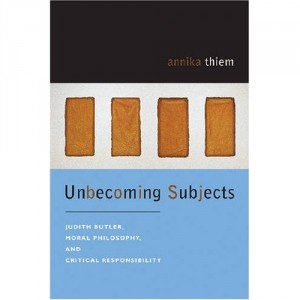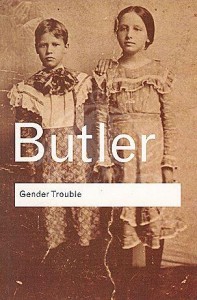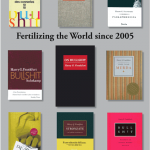It seems like I am always asking questions like this: How can the summer be over? How can it be the end of the second week of classes? And, most important for this post, how can it already be just one week before I present at the FEAST conference? Earlier in the summer, I wrote an entry about this presentation; I “promised” that it would be the first in a series of entries in preparation for the conference. I wrote that entry on July 23rd. Now, on September 18th, a week before the conference, I am finally offering the second entry. I have been thinking about my paper (no, really, I have), but prepping for classes–putting together the syllabi, setting up the blogs, etc–took up a lot of my time in August and early September. Oh well, better late than never.
If you recall (and if you don’t, that’s okay, just look here to “remember”), my presentation is about the ethical possibilities in Judith Butler’s Gender Trouble, particularly in her project of trouble (which I describe as making, being in and staying in trouble–hmm…isn’t that the name of this blog?). In my first entry, I wrote about why I think it is important to consider the ethical import of Gender Trouble. In this entry, I want to focus on my conclusion and engage in a ‘lil bit of musing about what my project is–that is, what I want to do with the idea of troublemaking/troublestaying as a virtue.
In the manuscript I submitted last February, here is how I conclude my presentation:
In concluding this presentation on Butler and the ethical value of troublemaking, I want to make my own ethical gesture towards troublemaking as staying in trouble. Thinking about troublemaking as staying in trouble shifts our ethical attention away from developing the practices or rules that should always guide our troublemaking and towards cultivating qualities of character that encourage us to approach a wide range of activities with a troublemaking (that is, critical, thoughtful and questioning) spirit/ethos. One potentially fruitful way to think about this troublemaking spirit is as a feminist virtue, that is, as an ethical way of being, a mode of relating to the world, a quality of character, a disposition, or an attitude that influences our ethical/political understandings and shapes our ethical and political development. Thinking about troublemaking as a virtue encourages us to ask after how we should live as troublemakers and what kind of (moral and political) selves we need to be in order to stay in trouble. And, it enables us to value troublemaking as an important quality of the moral self.
Having run out of time in my presentation, I want to end with two final questions: What would a feminist ethical project that emphasizes the virtue of troublemaking look like and how does this project differ from one that emphasizes the virtue of care? How might troublemaking as a feminist virtue shift our understanding of feminist ethics and feminist virtue ethics?
One big reason that this conclusion is so brief is because my presentation is limited to a certain number of minutes–I have 40 minutes total, but that includes discussion and I am very interested in what people will have to say about my project. But even though my conclusion needs to be brief, I want to develop it a little more in the following ways:
Why virtue? A key part of my argument is that we should look at troublemaking as a virtue. But, why? What does thinking about it as virtue offer us that thinking about it in other ways doesn’t? I like thinking about troublemaking as a virtue because of the emphasis, within virtue ethics and virtue-talk, on quality of character/attitude/ways of being. For me, troublemaking is not easily defined by a practice (or set of practices). It is a approach–a critical/attentive/curious approach–to life (to ideas, to beliefs, and to practices, etc). In this way, we can’t simply say that the ethical value of troublemaking is found in this or that practice. Instead, we can talk about how our way of engaging in a practice (are we aware of the limits of that practice, are we attentive to the effects of that practice on others, are we open to other ways of practicing) enables us to be more or less virtuous. This approach allows for a more expansive definition of what counts as troublemaking (it is not reduced to any practice or practices) and provides for the opportunity to think through how a wide range of practices might be or might not be troublemaking in an ethical/virtuous sense.
My vision of troublemaking as an ethical attitude is partly inspired by Michel Foucault and his discussion of the limit attitude in “What is Enlightenment?.” He describes this attitude, which he also calls the “critical ontology of ourselves” as “an attitude, an ethos, a philosophical life in which the critique of what we are is at one and the same time the historical analysis of the limits imposed on us and an experiment with the possibility of going beyond them” (319).
It is also inspired by Audre Lorde and her linking of the erotic with excellence and eros in “The Erotic as Power.” She writes: “For the erotic is not a question only of what we do; it is a question of how acutely and fully we can feel in the doing” (54). And, “in the way my body stretches to music and opens into response, hearkening to its deepest rhythms, so every level upon which I sense also opens to the erotically satisfying experience, whether it is dancing, building a bookcase, writing a poem, examining an idea” (57). Focusing on character and excellence enables us to think about ethical practices differently; it centers our discussion on self-making and the cultivation of a self who can learn to practice ethical (and politically transformative) troublemaking everyday–in a wide range of practices.
And my vision of troublemaking as an ethical attitude is inspired by Maria Lugones and her discussion of the playful attitude in “Playfulness, ‘World-Traveling’ and Loving Perception.” In describing a game she is playing with a friend–they are throwing stones in the water–she writes: “The playfulness of our activity does not presuppose that there is something like ‘crashing stones’ that is a particular form of play with its own rules. Instead, the attitude that carries us through the activity, a playful attitude, turns the activity into play” (95). So the determination that something is playful is not based on the type of activity it is. Instead it is based on the selves-at-that-moment who do it and the spirit/ethos of their individual and/or collective doing. In this way, suggesting that troublemaking is virtuous is based not on what the activity is (protesting, violent rebellion, talking back in class), but on how it is being done. But, wait. I want to offer another clarification here. The “how” it is being done is not just about intention (what one’s purpose is for engaging in the troublemaking), it is also about attention or, more specifically, attentiveness (how one is aware of the effects of that activity, how one notices and thinks through the implications of their actions in doing the activity, how one takes care of and is responsive to the others engaged in or affected by the activity). [note: this idea of attentiveness is inspired by conversations with Naomi Scheman and Rebecca Moskow].
Now, in thinking about troublemaking as an attitude or approach to one’s actions, I am not suggesting that becoming someone who engages in virtuous making of/being in/staying in trouble is as easy as “changing your attitude” (which is a critique that Kelly Oliver levels at Lugones’ playful attitude in her book, Witnessing: Beyond Recognition). When we link the idea of attitude with character and excellence and virtue, we can see that troublemaking as a virtue is not something that we easily and immediately are able to do. Instead it requires tremendous effort: training, repeated practice (habit) and the striving for a balance between being deficient and excessive in one’s troublemaking practices.
In “Locating Traitorous Identities: Toward a View of Privilege-Cognizant White Character,” Alison Bailey discusses the value of cultivating a virtuous character (in this essay, the virtue she is thinking about is traitorousness or being-a-traitor). Here is a helpful example she gives for understanding how developing this process works (and particularly how it involves more than just doing practices with a certain attitude):
The activity of virtue resembles the workout example. Just as a person does not become fit by doing a series of sit-ups and then declaring, “There, I am fit!” so a person does not become virtuous by doing a series of good deeds and then declaring, “Finally, I am virtuous!” Virtue and fitness arise in the process of continually working out or doing good deeds. We become virtuous when we have the practical wisdom [developed through this habitual practice], to act courageously to the right degree, for the right reasons, and under the right circumstances (38).
I think there is a tremendous amount of value to be found in thinking through how a person or persons could be trained to practice troublemaking in political and ethically responsible ways. Virtue ethics, with its emphasis on character, training, practice, habit, gives us the language and framework for thinking through how to do this.
Uh oh. I have enjoyed writing this entry, but it is over 1550 words long. That is about 1350 words longer than I need for wrapping up my presentation. Maybe I should approach this differently…later. For now, I’m done.






